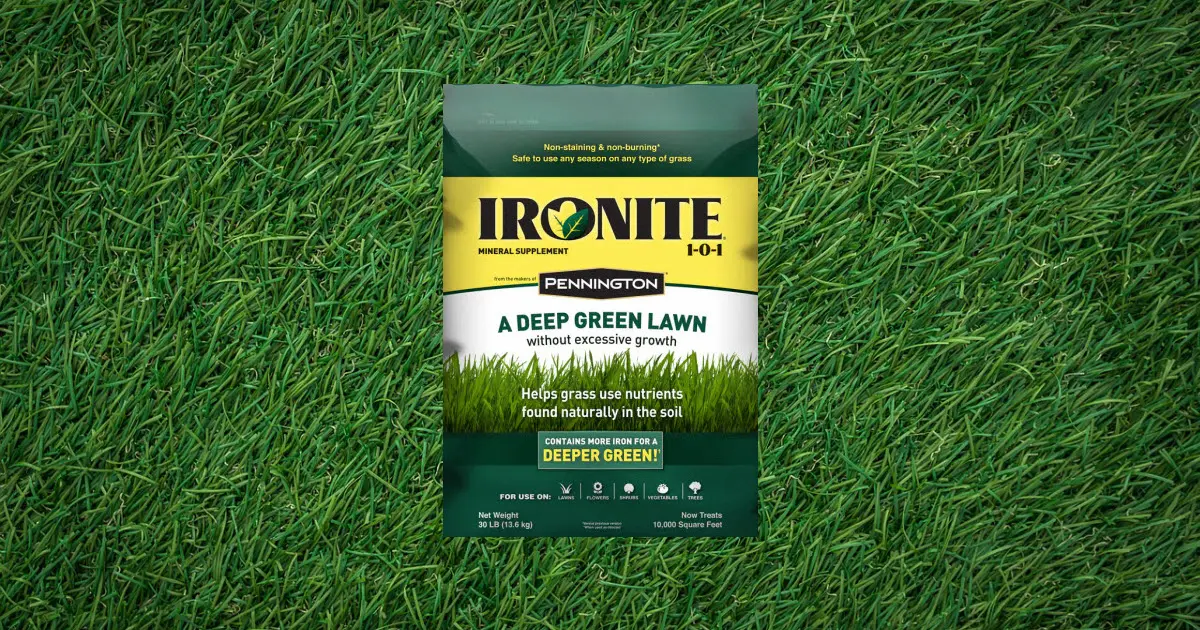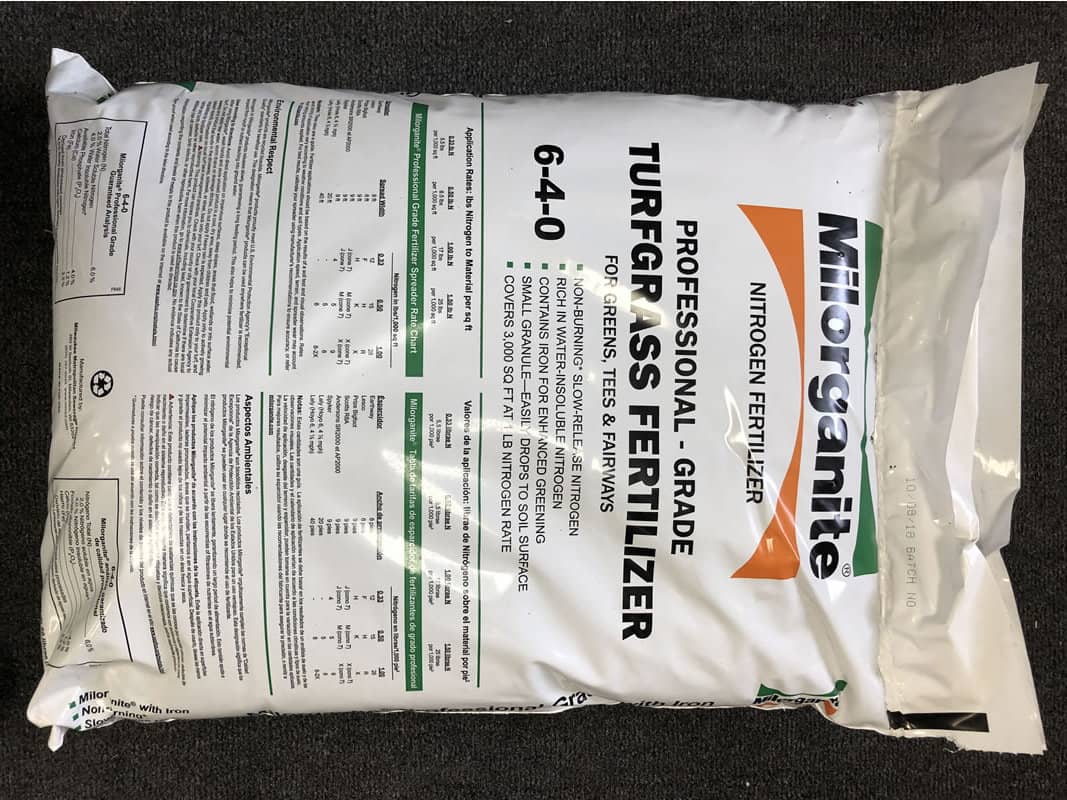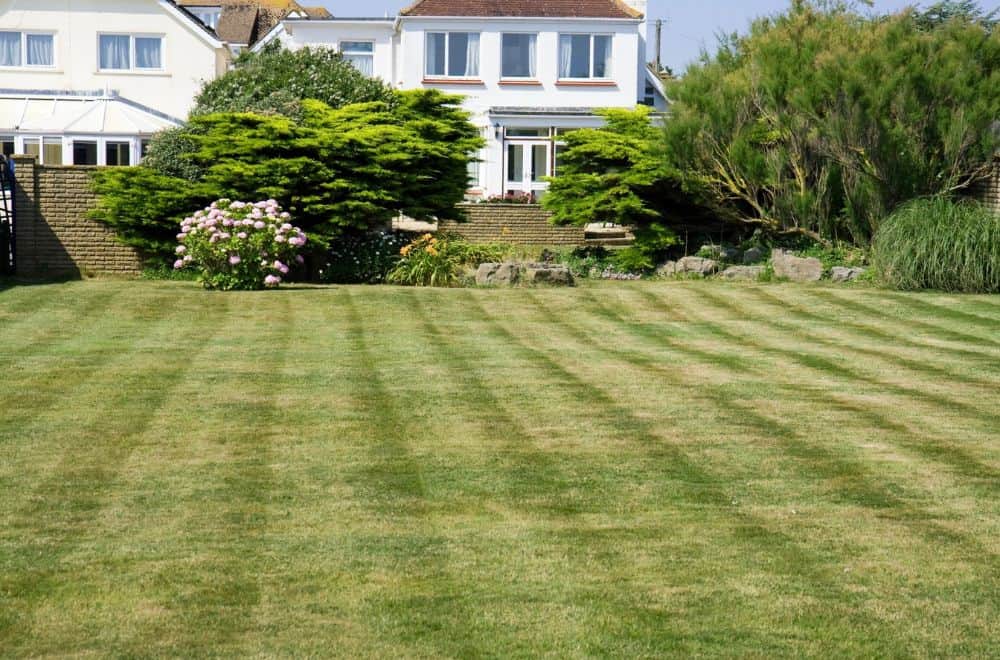Are you keen to improve your lawn’s soil quality? Do you want to make the grass greener? A healthy, lush, and green lawn is every homeowner’s dream. The two most popular products used by millions of lawn owners in America are Ironite and Milorganite. Both are brand-name formulations that work very well to improve the health of your yard.
Although these two products are used interchangeably, they are different, and they are used differently in lawn management. We wrote this article to demystify the difference between Ironite vs. Milorganite. In the end, you will know the pros and cons of each and which one to use for your specific lawn needs.
Keep reading to find out more!
What is Ironite?

Image Credit: lawnchick
Ironite is a supplement that you can use to re-green your lawn when the grass starts yellowing, as is usually the case in summer. Other than drought, iron deficiency can also slow down photosynthesis, causing the grass to lose its green pigmentation, i.e., chlorophyll.
Ironite, which primarily contains iron minerals, provides plants with iron, which aids in photosynthesis and enables plants to regain their green color. You will agree with us that when grass or any other plant for that matter is green, that is a sign of health and vibrancy.
Ironite, manufactured by Pennington, the leading lawn care specialists, gained popularity because of its fast action. Once you apply the supplement to your lawn, you will see results in a matter of a few days!
If you are looking to spruce up your lawn fast and achieve a noticeably greener lawn in a short time, Ironite is the way to go.
Many people ask, ‘can you apply Ironite and fertilizer at the same time? The answer is yes! In fact, this is the best way to give your grass the nutrients it needs to grow thick and to retain a healthy, deep green color, which is always a sign of a healthy lawn. Mix Ironite with a fertilizer such as Milorganite and apply it each month or quarterly, depending on your yard’s condition.
Ironite comes in two forms: granular and liquid. Whether the supplement comes in liquid or solid form may seem unimportant, but it makes a big difference. The type of soil in your lawn plays a significant role in selecting either granular or liquid Ironite.
Granular Ironite
It is best to use solid or granular Ironite in yards with normal, loam, or clay soils. You can sprinkle the granules on the soil and follow this with light watering.
Watering ensures that the granules get absorbed into the soil and deliver the nutrients needed to green your grass. We recommend mixing your granular Ironite with a slow-release fertilizer and applying the mixture to your lawn.
Liquid Ironite
If you live in an area with sandy and alkaline soil, liquid Ironite would be your best bet. Because these soils are loose, they are not good at retaining granules. The rains can quickly sweep away the granules, leaving the soil bare without any iron supplement to speak of.
Liquid Ironite formulas will penetrate the soil and stay there without the risk of erosion. Spraying the liquid on grass blades is also a good idea, as the grass blades will quickly absorb the formula, which quickens the greening process.
What is Milorganite?

Image Credit: advancelawnservice
Milorganite is an all-natural brand-name fertilizer made by the Milwaukee Metropolitan Sewerage District. This organic fertilizer is made from the leftover microbes used in the treatment of wastewater. The microbes are then put under high heat to dry and kill any bacteria picked up from the wastewater. The heat-dried microbes are packaged as a fertilizer known as Milorganite.
Because of its connection with wastewater, there are some myths about Milorganite. For example, people are often concerned that the fertilizer contains human feces and is unsafe. But this couldn’t be further from the truth.
Keep in mind that the leftover microbes and the absorbed waste are exposed to temperatures as high as 1200 degrees Fahrenheit. Such incredibly high temperatures kill off any harmful bacteria and other pathogens.
The milorganite also goes through thorough lab tests to ensure that it does not pose any dangers to the environment and humans. As such, you never have to worry about the safety and hygiene of this fertilizer. You can learn more about how milorganite is manufactured here.
Now that we have looked at what Ironite and milorganite are let’s go further and look at their differences and specific uses.
Which One is Better: Ironite vs. Milorganite?
When it comes to comparing Ironite vs. milorganite, it is not easy or even accurate to claim that one is better. These are two different products, they each perform various functions, and they are equally crucial in lawn care.
It is always best to mix Ironite with a fertilizer like milorganite so you can green your lawn and improve the soil quality at the same time. However, you can decide to apply the two products separately and at different times depending on your lawn condition.
Here’s what to keep in mind when choosing between Ironite and milorganite.
Feeding the Lawn
Plants, including grass, need more than just sunlight and water to grow, flourish, and remain healthy. They also require nutrients such as nitrogen, phosphorous, and potassium.
Grass requires large amounts of nitrogen more than any other nutrient. Nitrogen helps the grass to develop green, plush, and vibrant blades. In healthy soils, potassium and phosphorous minerals are available in sufficient amounts.
On the other hand, nitrogen is easily washed away when you water your lawn or when it rains. This mobility, combined with the fact that grass uses a large amount of nitrogen, means that you need to regularly replace nitrogen to ensure that your lawn has adequate amounts for a green and vibrant lawn.
A high-quality fertilizer such as Milorganite is an excellent choice for feeding your soil with the necessary nutrients for a healthy lawn. This organic formula is packed with slow-release nitrogen, ensuring that your soil is well fed and can sustain grass growth.
Ironite, on the other hand, is not a fertilizer but a greening supplement. Applying it to your lawn will not do much to the soil quality. If the soil is not well fed and does not contain enough nitrogen, no amount of Ironite will help maintain a healthy and green lawn.
Greening the Lawn
Is your lawn generally healthy, but the grass could use a little more green? Ironite is the better choice. One of the biggest advantages of using this particular lawn supplement is that it gets you results fast.
If you are hosting guests soon or for some reason, you need to green up your lawn fast, apply the recommended amount of Ironite, and you will see decent changes in the color of your grass in a few days.
Even if you are not in a hurry but are keen to maintain a lush green lawn all year round, Ironite will help you achieve this goal. It is recommended that you apply 1 pound of Ironite per 100 square feet of your yard for the best results. You should only apply Ironite to an established lawn.
Environmental Sustainability
These days, many of us are concerned about the impact that our day-to-day actions and lifestyle have on the environment. If you are keen to use sustainable and environmentally friendly products, milorganite might be a good option. This formula is made using heat-dried microbes that were used to reclaim and recycle wastewater.
That said, this doesn’t mean that Ironite is a wrong choice or that it is harmful. The difference is that the ingredients in Ironite, including iron, potash, nitrogen, and other micronutrients, are human-made or synthetic.
Both the fertilizer and lawn supplements are pet and child-safe, and they will not burn the grass in your lawn. However, you should follow application instructions to avoid over-applying the products. Too much can dry out the grass and cause it to develop a scorched or burnt appearance.
It would help if you also were careful when handling Ironite as it can easily stain concrete permanently. Based on personal experience using Ironite, we believe that it is an effective and worthwhile lawn care product.
However, if you have installed expensive concrete sidewalks and driveways in your home, you should think twice about using Ironite. If some of it touches the concrete, it might leave unsightly stains that can be difficult to deal with.
Summary
Whether you are a pro or a newbie, you will come across Ironite and milorganite to help with your lawn care needs.
Although they each have their pros and cons, they are both excellent formulas for nourishing your soil and sustaining the overall health of your lawn.
When choosing between Ironite vs. milorganite, keep in mind your specific lawn care needs. Ironite is the way to go when it comes to greening an established lawn. Milorganite is a fantastic source of the nitrogen your lawn soil needs to grow plushy, vibrant, and green grass.

Leave a comment